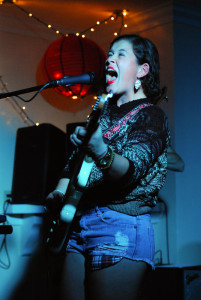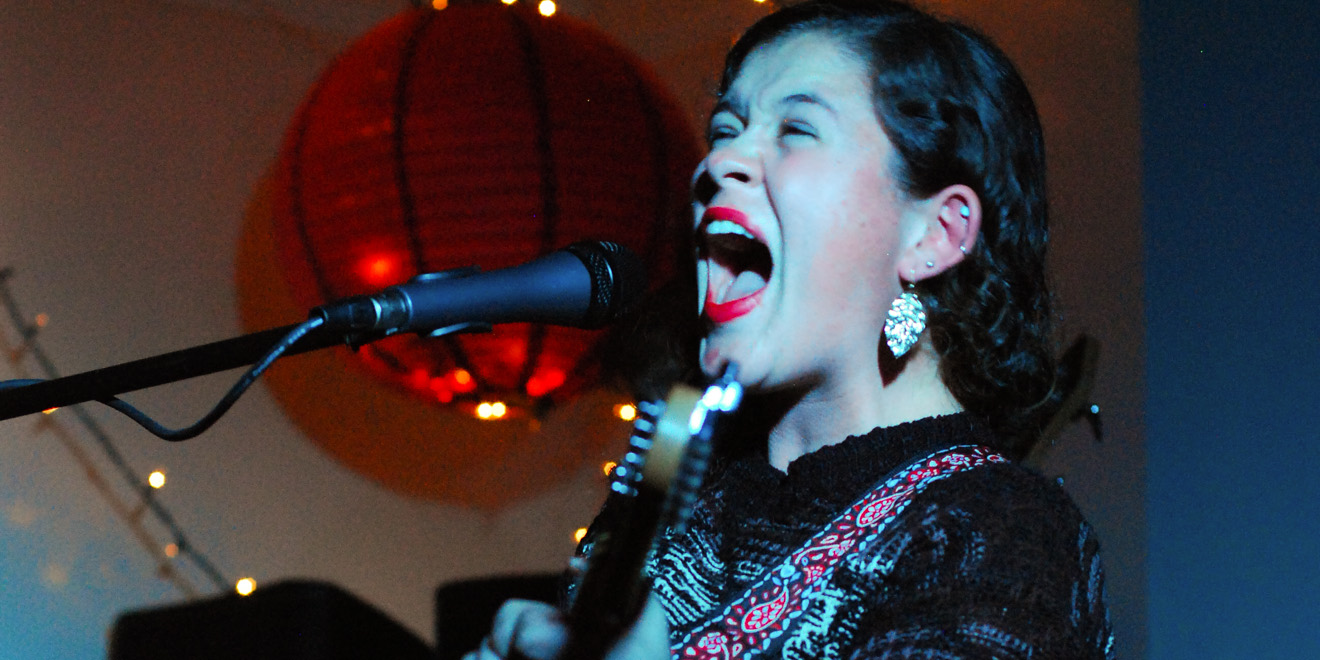Last Wednesday, students huddled together before the stage in White Plaza, clutching CoHo cappuccinos, awaiting the performance of the Stanford indie rock band Camp Youth. The platform was adorned with Christmas lights, drums, amps, and several microphones. The performance was in support of “Rhythms and Reflections,” an event sponsored by PIH Engage and Dance Marathon, featuring testimonials from student speakers on their experiences in global health who studied a wide variety of topics from maternal depression to public policy. Camp Youth played a set before and after each speaker, helping to draw a crowd of curious listeners with their magnetic presence.

Silence filled the air until Camp Youth burst into their opening song (“Eldridge Guns”). The band’s sound — characterized by Jenna Swartz’s smooth alto vocals and jangling lead guitar, Dan Ruprecht’s noteworthy bass, and Andrew Mitchell’s bright percussion — has influences beyond the indie rock genre. Touches of soul and vocal groups from the ‘50s and ‘60s could be heard, lending an undeniable uniqueness to their style.
Camp Youth’s cover of the Shakey Graves song “Dearly Departed,” with its passionate, call-and-response vocals recalled elements of soul, evoking the band’s soul-tinged rock contemporaries such as Alabama Shakes. Midway through the song, the instruments dropped out, leaving only Swartz’s fluid voice. Before long, both band and audience started clapping steadily to the beat. During one such interlude, Swartz invited a cycling student to join — “You, on the bike!” — eliciting a chuckle from the crowd, many of whom began as mere passersby but stopped to listen upon hearing the music.
The speakers between each set talked about several organizations, as well as their experiences with global health issues in a variety of locations from California to Senegal. One speaker, a HumBio major studying maternal depression and early childhood language development, shared a story about her work in Senegal: One night, during a severe power outage, she stood above the city when suddenly, the generators turned on, and she was amazed to see the wealthier half of the city lit up like fireworks, while the more impoverished side of the city remained in darkness. This stark contrast emphasized the global health inequality gap in her mind.
Remarkably, the group’s performance seemed to mirror such contrast of light and dark with their musical contrast of soft and loud, slow and fast, tranquil and energetic. Indeed, Camp Youth has a knack for this kind of musical dynamism. One moment they were playing a stirring ballad cover of “Blue Moon,” which recalled doo-wop songs of the 1950s like The Penguins’ “Earth Angel.” At other moments, they were playing beat-driven, guitar-riff-laden songs, such as “The Jungle,” an original song set to be released as Camp Youth’s first single this weekend. It will also be featured on their forthcoming EP. Such songs evoked the controlled energy of indie rock bands like The Strokes and Yeah Yeah Yeahs but with a more jubilant tone. When Swartz sang, “Come on now, take your chance to be free,” as the propelling lead and bass guitars played alongside one another, you could not help but bob your head and move to the beat.
After Camp Youth performed their final song, the audience’s disappointment at the concert ending so soon was audible; shouts of “encore!” erupted from the crowd. When the event organizers announced, “I think we have time for one more song,” the excitement that followed was equally palpable. The audience clamored for a cover of the Talking Heads’“Psycho Killer!” I was struck with enthusiasm as Swartz sang those famous lines: “Psycho killer! Qu’est-ce que c’est?” When she spat out the syllables “Fa-fa-fa-fa-fa-fa-fa-fa-fa-far,” they became not only intelligible but eloquent in her hands, set against the jumping, rollicking guitar and the jittery beat of the drums.
Throughout the performance, much of the crowd danced animatedly, singing along with Swartz, while others sat back to let the music wash over them. All in all, when Swartz sang “Run run run run away,” exploding into the chorus of “Ay-ay-ay-ay-ay-ay,” running was the furthest thing from our minds.
Contact Tyler Dunston at tdunston ‘at’ stanford.edu.
